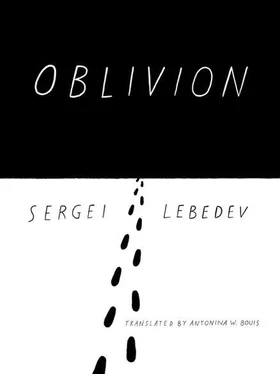The head of the archive received new documents once a quarter and the rest of the time he waged war against rats; the rats, apparently attracted by the smell of decomposing paper, crawled into the basement through pipes, chewed through wooden covers and doors, tried to jump into the pocket of his overalls when he went down from the common space to his work corner; the rats must have been lured by the warmth of the basement, the warmth of paper scraps, so good for creating a nest and bringing up baby rats, but they seemed to hate paper. Creatures of disasters and sorrows, wars and revolutions, creatures of the timeless times, they sensed that the archive was a warehouse of the past, even if the past was only data on ore excavation, and they tried to destroy, befoul, and shred the paper and bring up equally gluttonous progeny.
The old man blocked entries with concrete, sprinkled poison in corners, set up homemade traps; he was afraid—said the miner with the scar, laughing—that the rats would chew his wooden leg if he fell asleep in the basement and would never be able to get back upstairs. But that was a funny fear, and the old man laughed, too—the battle with rats gave meaning to his life and maybe the other envied him. Upstairs, in the mining offices, there were engineers, geologists, surveyors, management; they passed around test ore, argued about spare parts for the Belazes, ordered carloads of explosives, made plans, and drew schemata—while below in the basement a mining engineer with a wooden leg, caught once in a mine collapse, was fighting off rat attacks, and he believed that the upper floors stood only thanks to his struggles. The administration building was set on a foundation of paper, and the old man who retained the reverence for paper that came from the olden days when it was a rarity, no matter what was written on it, and its appearance in some village almost meant a change in destiny—the old man, who knew the value of income and expenditure, selflessly protected the archive; the stamps, signatures, the lines of extractions let you re-create the architectonics of fates and the march of time.
I told the old man Grandfather II’s surname again; he pondered, as if trying to remember on which shelf the documents could be.
“He was the warden of the camp,” the old man said after a pause. “There was no town here yet, just the camp, the quarry, and the mine. He was in charge of it all. Fifteen thousand people. Two thousand guards and employees, the rest were prisoners. He was in charge for a long time, around ten years, from the first barracks to the first houses. Then something happened to him, I don’t remember what. I wasn’t there, I know this from documents and stories. I have very few papers from that time, they are all kept by the ministries.”
“They called me in there once,” he added with a snigger. “They needed some reference about the factory. You know what’s there ? The same kind of archive as mine, just bigger. Massive deposits of paper. It lives a long time, paper. And they sit there, pulling their dirty tricks, not human beings, just identification badges, but there they sit on that paper, on old files.”
I remembered that building; the town had secret manufacturing plants, and that’s why there was a branch of that organization; I hadn’t gone there to ask about Grandfather II. The building was in the Constructivist style—a gray cube with an inner courtyard and a rectangular hanging arch; the cube seemed to be endowed with a special unloving life, and if it were fed, the building would grow, expanding to the size of the House on the Embankment, the warehouse of fates in Moscow, and then it would give birth to smaller cubes. There was something about that house, with its small inner courtyard shut by cast iron barred gates—something that exuded both prison and crematorium at the same time, two places where a person no longer belonged to himself; but that was the architecture speaking, the intention of previous times, but now—the old man was right—the building’s strength was only in the paper stored inside it.
Of course, now, two decades since the former regime had ended, there was nothing shockingly new among the files in the cardboard folders; but the point was that none of the cases had seen the light of a uniquely precise moment of history, at the only time when they could have changed anything; not necessarily, in fact probably not, but still it was possible. But now it was only dead paper; no demonic spirit, no aura of horror surrounded the office—just dead paper; the archives held what was left of people, there were pages with sentences, and the office even let you look at them, let you make photocopies, but kept the actual papers as collateral; even in death the office controlled those people, otherworldly serfs; the office turned out to be—without irony—the only owner of the assembly of souls.
All five former miners looked at me; now I couldn’t just up and leave, even if I had wanted to. What had happened to them—accidents, wounds, the life of a cripple—had happened to me; it was no longer the fact that the blood of Grandfather II who had started this place was in my blood; I had come here to rid myself of the shadow of Grandfather II, had come with an approximate idea of what I would learn, even though I had not imagined that Grandfather II was warden of a prison camp; I had come with an inner isolation from the place and its people and I had regarded the residents here only from one angle: what they could tell me. But here was the hellish hole in the ground and cripples damaged by a mine collapse, and I couldn’t learn anything dispassionately, first I had to reply to the question of who I was, before asking about Grandfather II; I had to stand beneath a mine collapse, call it down on myself, stay here—and only then something would be revealed to me, because I would become part of what was revealed.
In the morning—for I spent the evening there in the woods, going out for a bottle a few times as the youngest one, drank, and listened to stories of how the mine grew and the quarry expanded—I went to look for the new address of the man who had written to Grandfather II. On the street someone told me that the city had a lost and found office, which included an address bureau.
It was located in an old pump house; red brick with a pointy tin roof painted dark green, the pump house had been built by the steam engine depot, where there were garages now, and the water tower was given to the police for some reason. With narrow windows and brick crenellations, it looked like a fortress tower lost in geography. Inside it was cold—the cold water from the deep well had seeped into the bricks.
The lost and found office and the address bureau were run by one man—a police captain with the manner of a pickpocket, skinny, tall, all cartilage and fluidity, unable to sit still, able to be in two or three places at once; he did well among the lost wallets and long narrow drawers with address cards: the town lost things, people got lost in the town, and they came to him with every loss, and he sat there looking as if he had stolen the items, had lured away a person, and then, befitting his job, was also involved in the search.
The captain led me down a spiral staircase to the former pump room; now it was a storeroom for items and address files. Along the way he managed to complain that the lost and found wasn’t what it used to be—pronouncing “lost and found” with a special intonation; before, the captain said, people turned in more, whatever they found in the street, but now they would turn in a purse only if they’d found it on a bus and had called in the police to check whether it was a bomb; otherwise, nobody turned anything in.
Of course, the captain was exaggerating: we walked past piles of unclaimed items, dusty bundles, gutted wallets, attaché cases, ladies’ bags; I saw cosmetic bags, a roll of roofing felt, a picnic cooler, drafting tools, baby carriages, downhill skis and even ice skates; a plastic horse on wheels, milk cans, pails, carts, a bag of cement. It looked like the antechamber of the world to come, which people reached after a long journey, accumulating stuff as they went, and then had to leave it all here. The objects stood there, huddled in bunches like sheep without a shepherd, and it seemed that if anyone whistled to them, the carriages and carts would roll on their own and the rest of the stuff would climb in, and the canes and crutches would hobble and the skis would slide. The things were afraid: they were abandoned and now, aged and old-fashioned, they didn’t know what would happen to them; I saw the captain with fresh eyes: Did he understand what service he was doing? The losses of the entire city were gathered here and there was something bitter in the fact that they were unnoticed; it was easier to accept, to just pay no mind to the loss, even though the lost items could be found and returned.
Читать дальше












